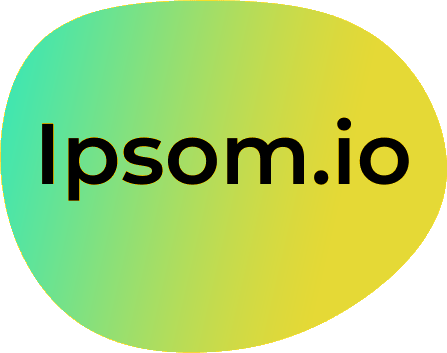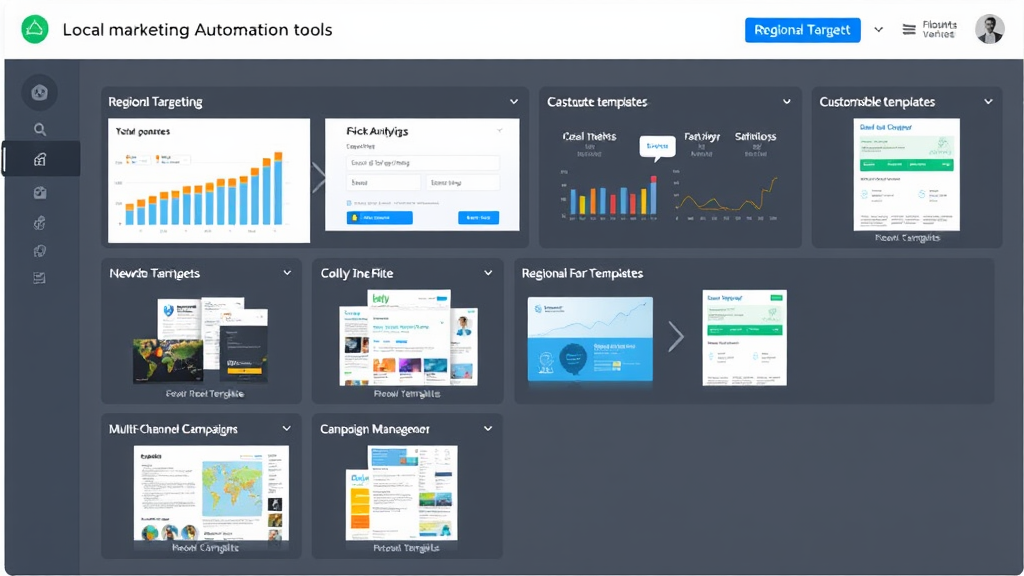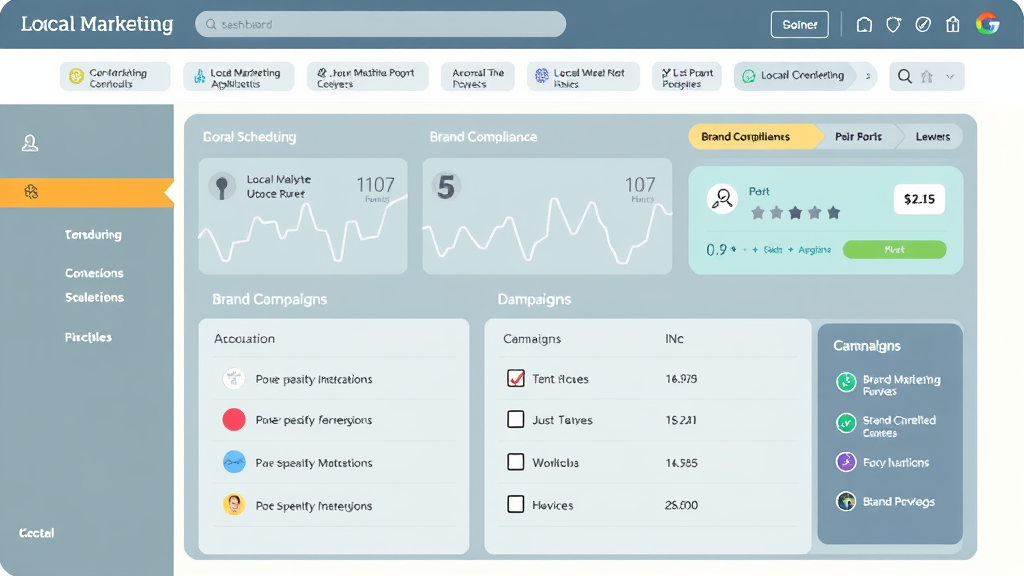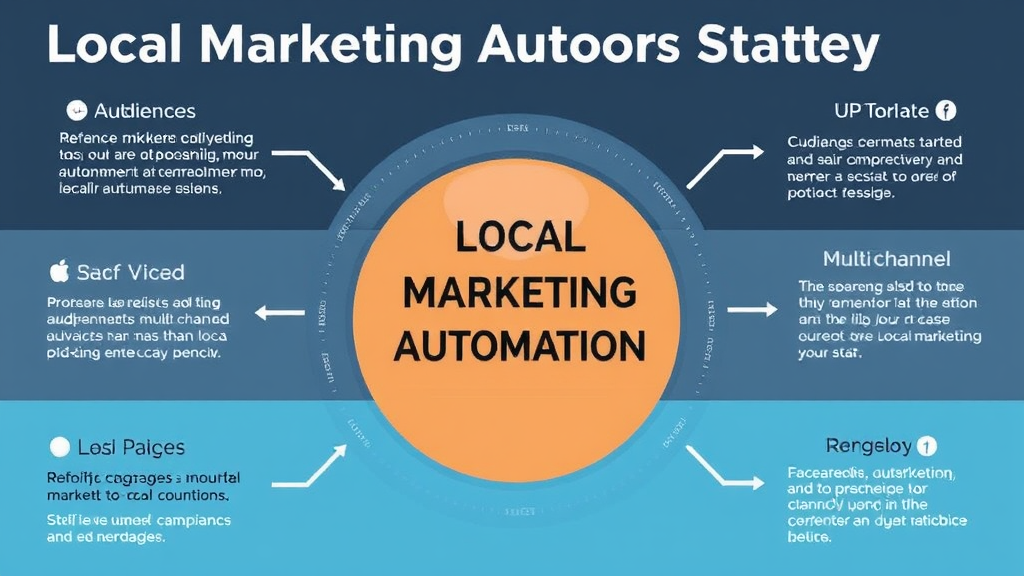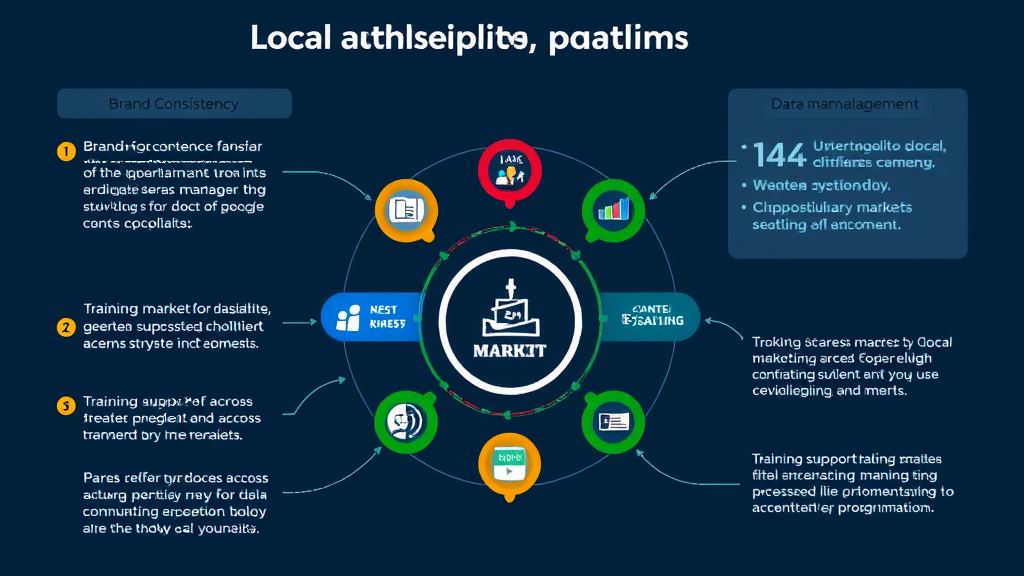Local marketing automation empowers businesses to efficiently manage and optimize their marketing efforts across various local markets. By automating tasks such as content creation, campaign management, and data analysis, companies can ensure consistent branding, personalized messaging, and improved customer engagement at the local level. This blog post explores the key aspects of local marketing automation, its benefits, and strategies for successful implementation.
Key Findings
-
Enhanced Brand Compliance: Automation tools ensure consistent branding and messaging across all local campaigns, maintaining brand integrity.
-
Improved Efficiency: Automating repetitive tasks streamlines marketing processes, reducing time and resource expenditure.
-
Personalized Local Campaigns: Automation enables the creation of tailored content that resonates with local audiences, increasing engagement.
-
Data-Driven Decision Making: Access to real-time analytics allows for informed adjustments to marketing strategies, optimizing performance.
-
Scalability: Businesses can effortlessly scale their marketing efforts across various locations, reaching a broader customer base without additional effort.
Understanding Local Marketing Automation and Its Importance
Local marketing automation (LMA) refers to the strategic use of automation tools to manage and execute marketing campaigns tailored to specific geographic regions. Unlike traditional marketing automation, which often focuses on broad, generalized strategies, LMA emphasizes creating content and campaigns that resonate with local audiences by considering their unique cultural nuances, language preferences, and regional trends.
Key Components of Local Marketing Automation:
-
Multi-Channel Coordination: LMA tools assist in managing various marketing channels—such as digital, email, social media, and traditional marketing—while ensuring brand compliance and consistency in messaging.
-
Curating and Customizing Co-Branded Content: These systems enable the creation of customizable templates that local marketers can adapt to their specific audiences, maintaining brand integrity while addressing local preferences.
-
Marketing Analytics: Integrated analytics allow businesses to track key performance metrics for local campaigns, facilitating data-driven decision-making and continuous optimization.
-
Lead Generation and Management: LMA tools help capture and nurture leads specific to each local market, ensuring timely and relevant follow-ups.
Importance of Local Marketing Automation:
-
Enhanced Brand Compliance: LMA ensures that all marketing efforts adhere to brand guidelines, legal standards, and regulatory requirements, maintaining a consistent brand identity across various regions.
-
Improved Efficiency: By automating repetitive tasks, businesses can reduce the time and effort required to execute local marketing campaigns, allowing teams to focus on strategic initiatives.
-
Data-Driven Insights: LMA solutions provide valuable data that can be used to tailor marketing strategies to specific local markets, leading to more effective and targeted campaigns.
-
Scalability: As businesses grow, LMA platforms can scale to accommodate expanding needs, ensuring consistent and effective marketing across multiple locations.
By implementing local marketing automation, businesses can effectively engage with diverse local markets, ensuring that their marketing efforts are both efficient and resonant with regional audiences.
External Sources: Learn More
Key Benefits of Implementing Local Marketing Automation
Implementing local marketing automation offers several key benefits that can significantly enhance a business's marketing efforts:
1. Enhanced Brand Compliance
Local marketing automation tools provide pre-built workflows and role-based permissions, ensuring that local marketers adhere to brand guidelines. This consistency builds trust with audiences and maintains the integrity of the brand across various campaigns.
2. Streamlined Campaign Management
By automating repetitive tasks such as scheduling posts and sending emails, businesses can reduce the time and effort required to execute local marketing campaigns. This efficiency allows marketing teams to focus on strategic initiatives and respond quickly to changing market conditions.
3. Improved Targeting and Personalization
Local marketing automation enables businesses to deliver personalized messages tailored to specific geographic areas and customer preferences. This targeted approach increases engagement and conversion rates by resonating more effectively with local audiences.
4. Cost Efficiency and Improved ROI
Automating local marketing functions can lead to more cost-efficient marketing by reducing manual labor and optimizing resource allocation. Additionally, real-time performance measurement allows businesses to identify and boost successful ads, further improving return on investment.
5. Consistent Messaging Across Campaigns
With a centralized platform, local marketing automation ensures that all marketing materials are brand-compliant and consistent across various channels. This uniformity prevents message dilution and enhances brand recognition.
6. Scalability
As businesses grow, local marketing automation solutions can scale to meet evolving needs, allowing for efficient management of marketing activities across multiple locations without significantly increasing workload.
By leveraging local marketing automation, businesses can achieve greater efficiency, improved targeting, and enhanced brand consistency, ultimately driving better results in their local markets.
External Sources: Learn More
Essential Features to Look for in Local Marketing Automation Tools
When selecting a local marketing automation tool, it's crucial to identify features that enhance efficiency and effectiveness in reaching local audiences. Key features to consider include:
Multi-Location Management: The ability to oversee campaigns across various regions from a single platform ensures personalized content delivery while maintaining brand consistency.
Audience Segmentation: Tools that allow segmentation based on location, behavior, or demographics enable tailored content, improving campaign effectiveness and engagement.
Customization and Personalization: The capacity to customize marketing messages for each local market is vital. Automation tools should offer templates or customization options for ads, emails, or social posts, ensuring resonance with local audiences without compromising brand integrity.
Data and Analytics: Access to robust analytics is essential. Effective platforms provide detailed reports on campaign performance across different locations, including audience engagement and conversion rates, facilitating strategy adjustments for improved results.
Multi-Channel Marketing Support: Supporting automation across various channels, such as social media, email, and direct mail, ensures a consistent message and simplifies campaign management.
Easy-to-Use Interface: An intuitive interface is crucial for saving time and reducing complexity, allowing team members to navigate and use the tool efficiently.
Integration with Existing Systems: Seamless integration with existing CRM, POS, and other systems ensures smooth data flow and maximizes efficiency in marketing operations.
Geotargeting Capabilities: The ability to target specific geographic areas ensures marketing campaigns reach the right audience.
Automation Workflows: Efficient automation of repetitive tasks saves time and ensures consistency in marketing efforts.
Customizable Templates: Pre-designed, customizable templates for emails, ads, and social media posts simplify content creation.
Social Media Integration: Seamless integration with social media channels allows scheduling and publishing posts, monitoring engagement, and tracking important metrics like reach and engagement.
Landing Pages and Forms: The ability to easily create and publish landing pages and forms optimized for conversion is critical for lead generation campaigns.
CRM Integration: Integration with your customer relationship management system allows tracking leads and customers throughout their entire journey, ensuring alignment between marketing and sales teams.
Review Management: Automation tools streamline review management by automating review requests, monitoring new reviews, and allowing you to search by keyword to find testimonials for specific use cases.
Digital Asset Management: The ability to tag and categorize all campaign assets, including images, video, fonts, audio, etc., and store them in a central database is crucial. Look for tools with version management features to track edits made to your files by in-house or external teams.
Security and Compliance: Ensure the platform follows industry best practices for data security and complies with relevant regulations to protect customer data.
Scalability: The chosen platform should accommodate your evolving marketing needs and handle increased workloads as your business expands.
Customer Support and Training: Ensure the vendor offers decent customer support and provides training during onboarding to ensure successful implementation.
By prioritizing these features, businesses can select a local marketing automation tool that effectively supports their local marketing strategies and drives engagement with target audiences.
External Sources: Learn More
Transform your business operations—start your journey with ipsom.io or connect with us at office@ipsom.io.
Strategies for Effective Local Marketing Automation Implementation
Implementing local marketing automation effectively requires a strategic approach tailored to the unique needs of each local market. Below are key strategies to ensure successful implementation:
1. Define Clear Objectives
Establish specific, measurable goals for your local marketing automation efforts, such as increasing local engagement, boosting regional sales, or enhancing brand awareness in targeted areas. Clear objectives provide direction and a basis for evaluating success.
2. Understand Your Local Audience
Conduct thorough research to identify the demographics, preferences, and behaviors of your local target audience. Creating detailed buyer personas enables the development of personalized marketing campaigns that resonate with local consumers.
3. Segment Your Audience
Divide your audience into smaller groups based on specific criteria such as location, behavior, or demographics. This segmentation allows for tailored messaging and campaigns that address the unique needs of each group, enhancing engagement and conversion rates.
4. Personalize Marketing Messages
Utilize the data collected to craft personalized messages that align with the interests and needs of each local segment. Personalization fosters a stronger connection with the audience and increases the likelihood of conversion.
5. Integrate with Existing Systems
Ensure that your marketing automation tools seamlessly integrate with existing systems such as Customer Relationship Management (CRM) platforms and analytics tools. This integration facilitates efficient data flow and provides a comprehensive view of customer interactions.
6. Develop Localized Content
Create high-quality content that reflects local culture, language, and trends. This approach enhances relevance and engagement among local audiences. For example, developing blog posts about local events or creating landing pages in the local language can be effective.
7. Implement Multi-Channel Campaigns
Utilize various channels, including email marketing, social media, and local SEO, to reach your target audience. A multi-channel approach ensures that your message reaches the audience through their preferred platforms, increasing engagement.
8. Monitor and Analyze Performance
Regularly track the performance of your campaigns using analytics tools to measure key metrics such as open rates, click-through rates, and conversion rates. This data allows for informed decisions and continuous optimization of your marketing strategies.
9. Train Your Team
Provide comprehensive training to your team on the use of marketing automation tools and best practices. A well-trained team can effectively manage and optimize campaigns, ensuring the success of your local marketing automation efforts.
By implementing these strategies, businesses can effectively leverage local marketing automation to enhance engagement, improve customer relationships, and drive growth in specific markets.
External Sources: Learn More
Transform your business with automation—visit ipsom.io or connect with us at office@ipsom.io.
Overcoming Common Challenges in Local Marketing Automation
Implementing local marketing automation can significantly enhance efficiency and consistency across various markets. However, businesses often encounter specific challenges during this process. Below are common obstacles and strategies to overcome them:
1. Maintaining Brand Consistency
Ensuring a uniform brand message across multiple locations is crucial. Variations in local markets can lead to inconsistent messaging.
Solution: Utilize automation platforms that allow customization while enforcing brand guidelines. Employ pre-approved templates and digital asset management tools to enable local teams to tailor content without deviating from the core brand message.
2. Measuring Success Across Locations
Tracking the effectiveness of marketing campaigns in different regions can be challenging without appropriate metrics.
Solution: Leverage automation platforms with advanced analytics and reporting features to gain insights into campaign performance per location. Regularly review these reports to adjust strategies and improve results, ensuring a data-driven approach to audience engagement.
3. Poor Integration with Existing Systems
Inadequate integration between marketing automation tools and existing systems like CRM or analytics platforms can create data silos and inefficiencies.
Solution: Choose automation tools that offer robust integration capabilities, such as pre-built connectors or APIs. Collaborate with IT teams to ensure seamless data flow between systems, enabling a unified view of customers and streamlined marketing processes.
4. Inadequate Data Quality and Management
Effective marketing automation relies on accurate and up-to-date data. Poor data quality can lead to misguided marketing efforts.
Solution: Implement regular data audits to update records and establish strict data entry protocols. Utilize tools that integrate data from various sources to create a unified customer view, ensuring that automation efforts are targeted and effective.
5. Insufficient Training and Support
Without proper training, teams may underutilize automation tools, leading to inefficiencies.
Solution: Invest in comprehensive training sessions covering both technical aspects and marketing strategies. Develop internal knowledge bases with training materials and best practices to support continuous learning and effective tool utilization.
6. Over-Reliance on Automation
Excessive dependence on automation can result in impersonal interactions and a lack of connection with the audience.
Solution: Balance automation with personal engagement. Use automation for routine tasks but ensure critical moments, such as sales inquiries or customer support, involve personal interaction. Regularly review automated campaigns to identify areas where a human touch could enhance the customer experience.
By addressing these challenges with the outlined solutions, businesses can effectively implement local marketing automation, leading to improved efficiency, consistency, and customer engagement.
External Sources: Learn More
Transform your workflow and boost productivity—check out ipsom.io or get in touch at office@ipsom.io.
Case Studies: Successful Local Marketing Automation in Action
Local marketing automation has proven to be a transformative strategy for businesses aiming to enhance their regional outreach and operational efficiency. Below are several case studies illustrating successful implementations:
Pet Supplies Plus: Personalizing Promotions
Pet Supplies Plus, a U.S. pet supply retailer with over 500 stores, utilized a local marketing automation platform to tailor email promotions based on regional factors. This approach allowed franchisees to customize messaging according to local events, inventory, and customer preferences, resulting in increased customer engagement and boosted in-store traffic and sales conversions.
Anytime Fitness: Streamlining Social Media Management
Anytime Fitness, a global gym franchise with more than 4,500 locations, implemented local marketing automation tools to manage its social media presence across various locations. The automation platform enabled franchisees to schedule localized posts while maintaining brand consistency, saving time and enhancing engagement with targeted local content.
MOD Pizza: Enhancing Customer Engagement through Automated Reviews
MOD Pizza, a fast-casual pizza chain with over 500 locations, adopted local marketing automation software to manage online reviews and feedback. The system automatically requested customer feedback post-visit and alerted local managers to new reviews, allowing for prompt engagement. This strategy improved overall ratings and customer satisfaction, leading to increased positive reviews and customer loyalty.
Southside Plumbing: Revenue Growth through Marketing Automation
Southside Plumbing implemented marketing automation campaigns focusing on cross-promoting services to existing customers. By delivering targeted messages about additional services like water purification systems to their scheduled service club members, they achieved a 263% revenue increase over eight months.
Papeloja: CRM Integration and Automation
Papeloja, a wholesale specialty paper business, integrated a Customer Relationship Management (CRM) system with marketing automation tools to streamline operations. This integration facilitated automated follow-ups and personalized customer interactions, leading to an 800% growth in just a few months.
These examples demonstrate the significant impact of local marketing automation in enhancing customer engagement, streamlining operations, and driving substantial business growth.
External Sources: Learn More
Liberate your business with intelligent automation—check out ipsom.io or get in touch at office@ipsom.io.
FAQ – Frequently Asked Questions
What is local marketing automation?
Local marketing automation (LMA) involves using technology to streamline and manage marketing efforts tailored to specific geographic areas. It enables businesses to create, execute, and monitor campaigns that resonate with local audiences while maintaining brand consistency.
Key Components of LMA:
-
Multi-Channel Coordination: Managing various marketing channels, such as digital, email, social media, and traditional marketing, to ensure consistent messaging and brand identity.
-
Customizable Content: Providing templates that allow local partners to adapt marketing materials to their specific markets while adhering to brand guidelines.
-
Marketing Analytics: Utilizing data to track campaign performance across different locations, facilitating informed decision-making and strategy adjustments.
Benefits of LMA:
-
Efficiency: Automating repetitive tasks saves time, allowing marketing teams to focus on strategic initiatives.
-
Brand Consistency: Ensures uniform messaging and branding across all locations, enhancing brand recognition and trust.
-
Personalization: Tailors marketing messages to local audiences, increasing relevance and engagement.
-
Scalability: Facilitates the expansion of marketing efforts across multiple locations without significantly increasing workload.
By implementing local marketing automation, businesses can effectively manage localized campaigns, improve customer engagement, and achieve better returns on their marketing investments.
How does local marketing automation improve brand compliance?
Local marketing automation enhances brand compliance by providing pre-built workflows and customizable templates that enforce brand guidelines. These tools allow brands to set role-based permissions, restricting changes where necessary, ensuring consistent branding across campaigns. By centralizing brand assets and automating compliance processes, local marketers can efficiently create materials that adhere to brand standards, reducing the risk of non-compliant executions. (engagebay.com, pageflex.com)
Can small businesses benefit from local marketing automation?
Yes, small businesses can significantly benefit from local marketing automation. It streamlines marketing tasks, saving time and resources, and enables personalized, targeted campaigns that enhance customer engagement. Additionally, it provides valuable insights into campaign performance, allowing for data-driven decisions and improved return on investment.
What are the key features to look for in a local marketing automation tool?
When selecting a local marketing automation tool, consider the following key features:
-
Multi-Location Management: Ability to oversee campaigns across various regions from a single platform, ensuring personalized content while maintaining brand consistency.
-
Audience Segmentation: Tools to segment audiences based on location, behavior, or demographics, allowing tailored content for improved engagement.
-
Customization and Personalization: Options to customize marketing messages for each local market, ensuring relevance and adherence to brand guidelines.
-
Multi-Channel Marketing Support: Support for various marketing channels, enabling engagement with local customers across multiple platforms.
-
Analytics and Reporting: Comprehensive analytics and reporting features to track campaign performance, measure ROI, and gain insights into audience behavior.
-
Integration with Existing Systems: Seamless integration with existing CRM, POS, and other systems to ensure smooth data flow and maximize efficiency.
-
Ease of Use and User Interface: An intuitive, user-friendly interface that simplifies navigation, campaign setup, and result analysis without extensive training.
-
Digital Asset Management: Efficient organization, sharing, and retrieval of digital brand assets, enhancing productivity and minimizing errors.
-
Review Management: Tools to automate review requests, monitor new reviews, and facilitate timely responses, improving customer engagement and reputation.
-
Automation Workflows: Efficient automation of repetitive tasks to save time and ensure consistency in marketing efforts.
-
Geotargeting Capabilities: Ability to target specific geographic areas, ensuring marketing campaigns reach the right local audience.
-
Security and Support: Robust data security measures and reliable customer support to protect sensitive information and provide assistance when needed.
Selecting a tool with these features will enhance your ability to connect effectively with local audiences and streamline your marketing operations.
How can businesses measure the success of their local marketing automation efforts?
Businesses can measure the success of their local marketing automation efforts by tracking key performance indicators (KPIs) that reflect engagement, efficiency, and financial outcomes. Essential metrics include:
-
Conversion Rate: The percentage of leads completing desired actions, such as purchases or sign-ups, indicating campaign effectiveness.
-
Customer Acquisition Cost (CAC): The total expense to acquire a new customer, helping assess the cost-effectiveness of marketing strategies.
-
Customer Lifetime Value (CLV): The total revenue expected from a customer over their relationship with the business, aiding in evaluating long-term profitability.
-
Click-Through Rate (CTR): The percentage of recipients clicking on links within marketing materials, measuring content engagement.
-
Email Open Rate: The percentage of recipients opening marketing emails, reflecting the effectiveness of subject lines and sender reputation.
-
Return on Investment (ROI): The profitability of marketing efforts, calculated by comparing net profit to the total cost of the campaign.
-
Lead Response Time: The average time taken to respond to new leads, with quicker responses often leading to higher conversion rates.
-
Local Search Rankings: Monitoring positions in local search results to gauge visibility among local audiences.
-
Online Reviews and Ratings: Assessing the quantity and sentiment of customer reviews to understand brand reputation and customer satisfaction.
Regularly analyzing these metrics enables businesses to refine their local marketing automation strategies for improved performance and customer engagement.
